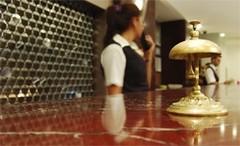Average UK hotel room rate falls 1% as hoteliers try to keep prices competitive

While the global average hotel room rate per night rose to 4 per cent, the annual Hotel Price Index by Hotels.com found that the UK bucked the trend last year because many hoteliers had decided to swallow the 2.5 per cent VAT increase instead of adding the cost onto room rates. It also blamed the rise in the number of budget hotels opening, which lowered the average room cost.
A separate survey of Best Western members also found that although bookings were up last year, competitive pricing is an issue among independent hoteliers with 62 per cent saying they are being hampered by a price war with other hotels and 69 per cent saying they felt an expectation from customers to offer a discount.
Keith Pope, managing director of Best Western, said although 80 per cent of hoteliers had seen an increase in sales on the previous year, only 49 per cent had reported an increase in profits, so were having to work harder than ever to survive.
“We were encouraged to see the results of this annual survey and it shows that many independent hoteliers are working hard to ensure their businesses survive these really challenging economic times. That said, there’s also no doubt that many independent hoteliers are still feeling anxious about the year ahead," he said.
Room rates
Although the average room rate per night fell last year in the UK, Hotels.com's survey, which studies the prices paid by guests staying in 142,000 properties in 85 countries, did find that many hotels in the UK had increased prices on those in 2010.
While London held steady with a 1 per cent rise, hotels in towns surrounding the capital - Watford, High Wycombe and St Albans, for example - all increased prices (by 22, 19 and 10 per cent respectively) as did hoteliers in major tourist destinations such as Oxford, Cambridge and The Cotswolds.
Hotel room rates in Cornwall fell by up to 20 per cent however, as did those in Edinburgh, St Andrews and Aviemore and certain cities such as Newcastle and Liverpool.
Popular destinations
Even though prices fell on average, large UK cities continued to fare well in terms of popularity and visits. The five most popular UK destinations for overseas visitors according to the bookings website were the same as last year - namely London, Edinburgh, Manchester, Liverpool and Glasgow while domestic visitors preferred Birmingham over Liverpool.
David Roche, president of Hotels.com said the sector should feel positive overall: “The hotel sector is a good barometer for the global economy as a whole. Prices are up because demand for rooms is on the rise – a sign of higher levels of business and consumer spending. Local conditions, influenced last year by political uprisings, natural disasters and currency fluctuations, do have a major impact on prices but, overall, the momentum is there and the market is growing.”
Top 10 UK destinations for overseas travellers:
- London
- Edinburgh
- Manchester
- Liverpool
- Glasgow
- Birmingham
- Belfast
- Brighton
- Bristol
- Aberdeen
Top 10 UK destinations for UK travellers:
- London
- Manchester
- Edinburgh
- Birmingham
- Glasgow
- Liverpool
- Bristol
- Leeds
- Cardiff
- Brighton















